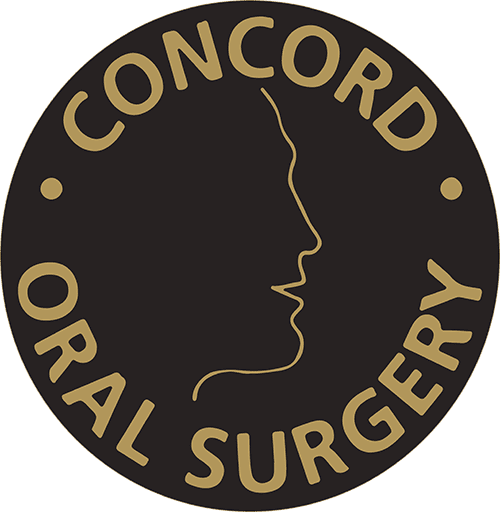Reviewed By Dr. Robert Barron, DMD
Reading Time: 5 minutes
At what point does a dental problem become a dental emergency?
Is it when you feel sudden tooth pain, or when an injury leaves your jaw swollen and tender?
In this blog, we will explain what situations may require emergency oral surgery and what you should do in an emergency situation.
Emergency oral surgery is required to address severe dental trauma or facial injuries. At Concord Oral Surgery, we prioritize emergencies by accommodating same-day appointments for existing patients and same- or next-day care for new patients.If you call after hours, our answering service will connect you directly with our oral surgeon Dr. Barron, who will guide you on what to do until you can visit the oral surgery clinic.
Table of Contents
Key Takeaway
You might need emergency oral surgery if you experience severe tooth pain, facial trauma, swelling, or a knocked-out tooth. Contact an oral surgeon as soon as possible to address the issue and prevent further complications.
When Is Emergency Oral Surgery Needed?
Facial Trauma
Facial trauma refers to injuries affecting your jaw, cheekbones, or other facial structures, often caused by accidents, falls, or sports injuries.
These injuries can result in fractures, severe swelling, or lacerations that may compromise your appearance and function.
What to do:
- Stay calm: Gently support the injured area with your hands or a soft towel.
- Control bleeding: Apply light pressure with gauze or a clean cloth if there is bleeding.
- Seek help: If the injury is severe, proceed to your nearest emergency room.
Severe Jaw Swelling or Infection
Severe jaw swelling or infection is often the result of deep infections, such as abscesses or cellulitis.
These conditions require prompt attention as they may lead to more severe health risks if untreated.
What to do:
- Do not ignore the swelling: Apply a cold compress to reduce discomfort.
- Avoid heat or self-draining: These can worsen the infection.
- Get help: You may need drainage or surgical intervention to address the issue. Consult with your general practitioner or an oral surgeon.
Knocked-Out Teeth with Bone or Soft Tissue Damage
A knocked-out tooth often involves surrounding tissue damage to the gum or bone.
In this case, immediate action is important to preserve the tooth and prevent complications. The trauma may also damage the soft tissue, requiring surgical repair.
What to do:
- Handle the tooth carefully: Pick it up by the crown, not the root, and rinse it gently with water.
- Store it properly: Place it in milk or saline solution to keep it moist.
- Seek care immediately: An oral surgeon can repair damaged tissue and prepare for tooth reimplantation or replacement.
Oral Infections Affecting Bone or Jaw
Oral infections that affect the bone or jaw, such as osteomyelitis (infection in the bone) or Ludwig’s angina (bacterial infection in the floor of the mouth or neck), can severely compromise your oral health.
These infections occur when bacteria spread to the bone or surrounding tissues, causing pain, swelling, and other symptoms.
What to do:
- Monitor symptoms: Watch for fever, severe pain, or swelling.
- Do not delay: Call for an emergency evaluation to determine if surgical treatment is necessary.
Jaw Dislocation
Jaw dislocation occurs when the lower jawbone moves out of its normal position, usually due to trauma or if you open your mouth too wide. This can cause pain, difficulty speaking, and problems with eating.
What to do:
- Do not try to fix it yourself: This can cause further damage.
- Support the jaw: Use a soft wrap or scarf for stabilization.
- Seek help immediately: Call an emergency oral surgeon or visit your nearest emergency room.
Complications from Previous Oral Surgery
Complications following oral surgeries, such as wisdom teeth removal or dental implant placement, may include uncontrolled bleeding, dry socket, or infection.
What to do:
- Seek immediate care: Call your oral surgeon right away. Prompt treatment prevents complications from worsening.
Dental Implant Emergencies
Dental implant emergencies occur when an implant becomes loose, infected, or experiences hardware failure.
What to do:
- Do not ignore the issue: Loose implants can lead to bone loss if left untreated.
- Rinse with salt water: Keep the area clean to reduce bacteria.
- Call your oral surgeon: Your oral surgeon will evaluate the implant and determine the best course of action.
Severe Soft Tissue Injuries
Severe soft tissue injuries include cuts or tears to the gums, tongue, or cheeks. These injuries can cause excessive bleeding and increase the risk of infection if not treated promptly.
What to do:
- Control bleeding: Use gauze or a clean cloth to apply pressure.
- Rinse gently: Use water or a saline solution to clean the wound.
- Seek immediate care: Call an emergency oral surgeon or visit your nearest emergency room.
Contact Us for Emergency Dental Care in Vaughan, ON
If you are facing a dental emergency and need immediate care, call (905) 669-2616 or visit our oral surgery clinic in Vaughan, ON, located at 3300 Highway 7 West, Suite 805.
For after-hours emergencies, our answering service will connect you with Dr. Barron for guidance.
Do not wait-your oral health and safety come first!

